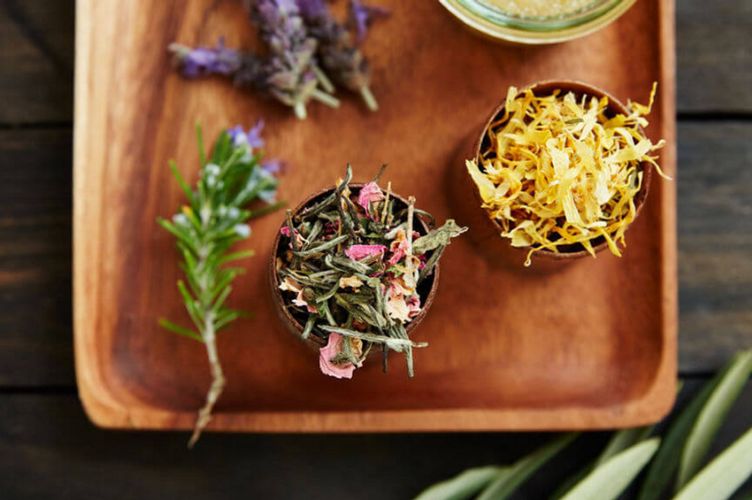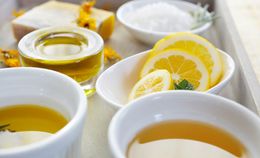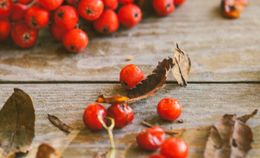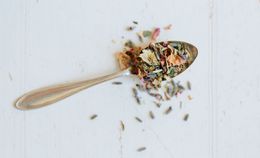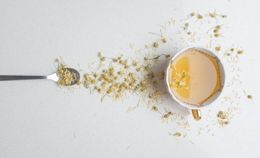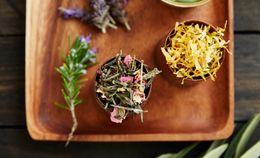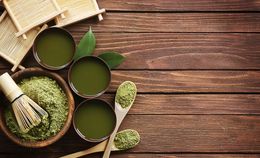Many people who are diagnosed with Crohn’s Disease are given little hope. That their debilitating symptoms could last years or potentially for the rest of their life. However, there ARE many natural, herbal therapeutics out there to help support the uncomfortable symptoms of Crohn’s Disease and ways to work with Crohn’s from the root using herbs. Read on to discover some of the essential herbal therapeutics for Crohn’s Disease.

Regulate Inflammation
Since inflammation tends to run rampant with Crohn’s Disease, using herbs that can effectively modulate inflammation is a great first step. Herbs that regulate inflammation can be used both internally and topically over the belly. For instance, infusing chaparral (Larrea tridentata) in a castor oil pack throughout the day during an acute flare of Crohn’s Disease can provide relief. It is crucial to remember that inflammation is not a “bad” thing. It is simply a warning sign that the body presents to let us know that something is going on we need to pay attention to it for our health. Stay mindful if you are simply focusing on using “anti-inflammatory” herbal therapeutics which could potentially cover up our vital and important inflammatory warning signs. Drawing from herbs that focus on modulating our inflammatory response when needed is a more healthy approach. Some herbs to draw from for this include turmeric (Curcuma longa), rosemary (Rosmarinus officinalis), Boswellia (Boswellia serrata), Calendula (Calendula officinalis), and marshmallow root (Althea officinalis).
Deep Sleep
In order for our body to do the healing it needs on the digestive system, we must get adequate sleep every night. Although it is easy to compromise sleep hours with extra work or staying out late at a party, when dealing with a chronic inflammatory bowel condition like Crohn’s Disease, sleep is non-negotiable. Herbal therapeutics can be very helpful to address sleep issues and ensure that you get a deep night’s rest. Some of my go-to herbs to use at bedtime are skullcap (Scutellaria lateriflora), California poppy (Eschscholzia californica), Passionflower (Passiflora incarnata), and valerian (Valeriana officinalis). Since most of the sleepy time herbs tend to be bitter and pungent in flavor, I suggest taking them in tincture form instead of tea, although either will work.
Unwind The Mind
Although it's easier said than done, reducing and eliminating stressors in your life is a crucial step for supporting Crohn’s. Increased stress levels have been shown to trigger flare-ups of Crohn’s Disease and make inflammatory bowel disease (IBD) symptoms worse overall. Yes, some stressors in life are unavoidable...but you CAN help change the way you respond to these stressors instead of reacting to them using different herbal therapeutics. One of my favorite herbs for helping balance stress levels and relax the mind without putting you to sleep is tulsi (Ocimum sanctum). Typically when working with clients to down-regulate stress, I focus on restoring the nervous system so that they are less likely to jump into “fight-or-flight” mode through their sympathetic nervous system and instead stay in their “rest and digest” parasympathetic state. My go-to herbs for helping restore the nervous system are oatstraw/milky oats (Avena sativa), lavender (Lavandula spp.), St. John’s wort (Hypericum perforatum), and damiana (Turnera diffusa).
Hydration = Key
Since diarrhea is one of the leading causes of dehydration and a common symptom of Crohn’s Disease, it’s crucial to stay hydrated throughout acute flares. In addition to using electrolytes, drinking coconut water, and/or adding trace minerals to your water, incorporating moistening and mucilaginous herbs can be helpful in staying hydrated. Some of my favorites are marshmallow root, spearmint (Mentha spicata), slippery elm (Ulmus rubra) and cucumber (Cucumis sativus). I suggest preparing any of these as an overnight infusion to pull out more of the mucilaginous content. The demulcent nature of slippery elm, marshmallow root, and cucumber can also help soothe irritated and inflamed tissues throughout the gastrointestinal (GI) tract in addition to promoting tissue healing. Turn toward demulcent herbs like these for calming support during an acute Crohn’s Disease flare-up.
Essential Reminder
In getting to the root of your Crohn’s Disease, I always suggest to my clients to create their specialized health team including a Clinical Herbalist and their medical doctor to help guide them along the way. There are some red flags in an acute Crohn’s Disease flare that you will want to seek immediate professional medical attention if they occur. These include weight loss that is greater than 10 pounds, dehydration, bloody diarrhea, and blurred vision. Red flags in chronic Crohn’s Disease include extracolonic complications, primary sclerosing cholangitis, thromboembolic events, lymphadenopathy, and cachexia. There are many helpful ways to support both chronic and acute flares of Crohn’s Disease.

